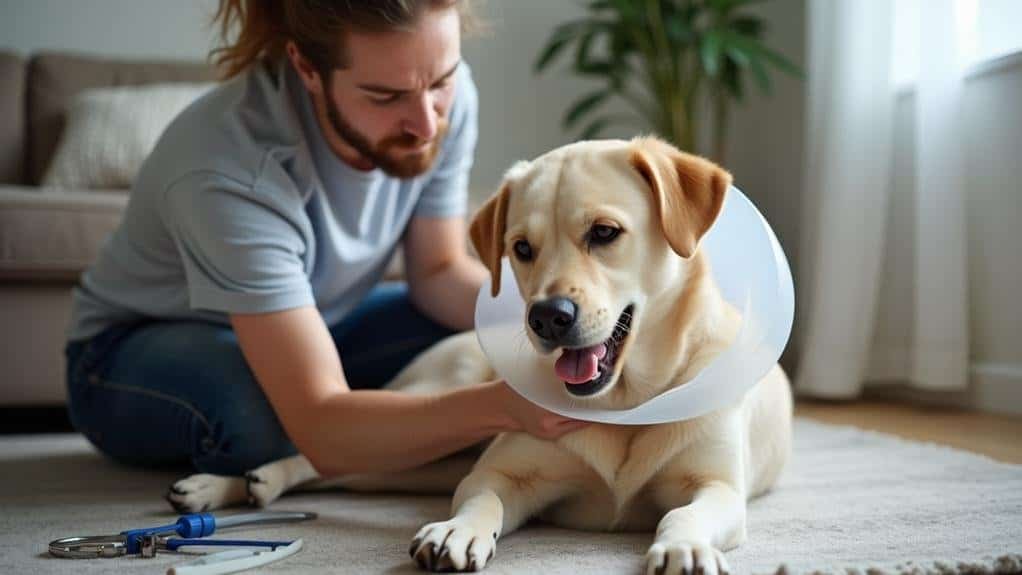Your dog's butt-licking can be normal grooming, but excessive licking may signal health issues. Common causes include anal gland problems, intestinal parasites, allergies, or skin irritations. Dietary factors and behavioral issues like stress or boredom can also contribute. To address this, guarantee regular grooming, maintain a balanced diet, and provide mental stimulation. Watch for signs of redness, swelling, or irritation around the anal area. If the behavior persists or you notice additional symptoms, consult your veterinarian. They can diagnose underlying problems and recommend appropriate treatments. Understanding the various factors at play can help you better care for your furry friend.
Normal Canine Grooming Behavior

A dog's tongue is a versatile tool, serving multiple purposes beyond just tasting food. When it comes to your dog licking its butt, you might be surprised to learn that this behavior is often part of normal grooming.
Dogs use their tongues to clean themselves, including their anal area, as a way to maintain hygiene and remove dirt or feces. This natural behavior helps your dog stay clean and healthy. The saliva contains enzymes that can combat bacteria, contributing to your pet's overall well-being.
It's important to understand that occasional licking is typically not a cause for concern. In fact, it's an instinctual behavior inherited from their wild ancestors.
However, while some butt licking is normal, you should be aware of excessive licking. If you notice your dog constantly attending to this area, it could indicate underlying health issues. Problems with anal glands, skin infections, or other medical conditions might be the culprit.
Keep an eye on the frequency and duration of your dog's licking, and consult your veterinarian if you suspect it's becoming problematic. By understanding the difference between normal grooming and excessive licking, you can better guarantee your dog's health and comfort.
Signs of Excessive Licking
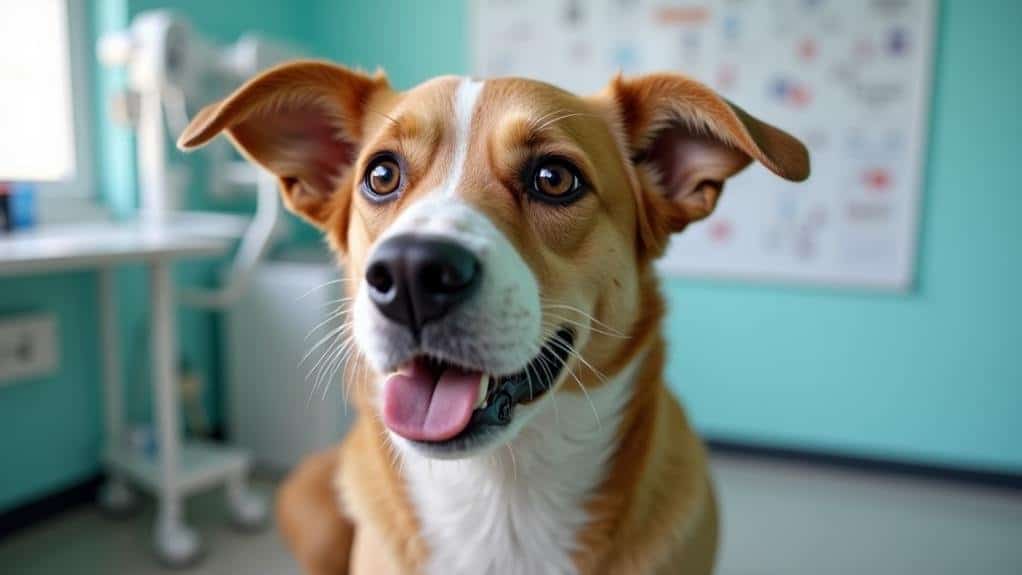
While occasional butt licking is normal for dogs, it's important to recognize when this behavior becomes excessive. If you notice your dog constantly licking their anal area, it may indicate an underlying medical issue that requires attention. Signs of excessive licking include redness, swelling, or irritation around the anus.
You might also observe your dog scooting their rear on the ground, which can be an attempt to relieve anal gland pressure or discomfort.
Keep a close eye on the frequency of your dog's licking behavior. If it becomes obsessive or persistent, it's time to consult a veterinarian. Excessive licking can lead to skin damage and create an entry point for bacteria, potentially causing secondary infections.
Common underlying causes include anal gland problems, skin allergies, or infections.
Don't ignore these signs, as they can worsen over time. Continuous licking can compromise the skin barrier, leading to more serious health issues.
Anal Gland Issues
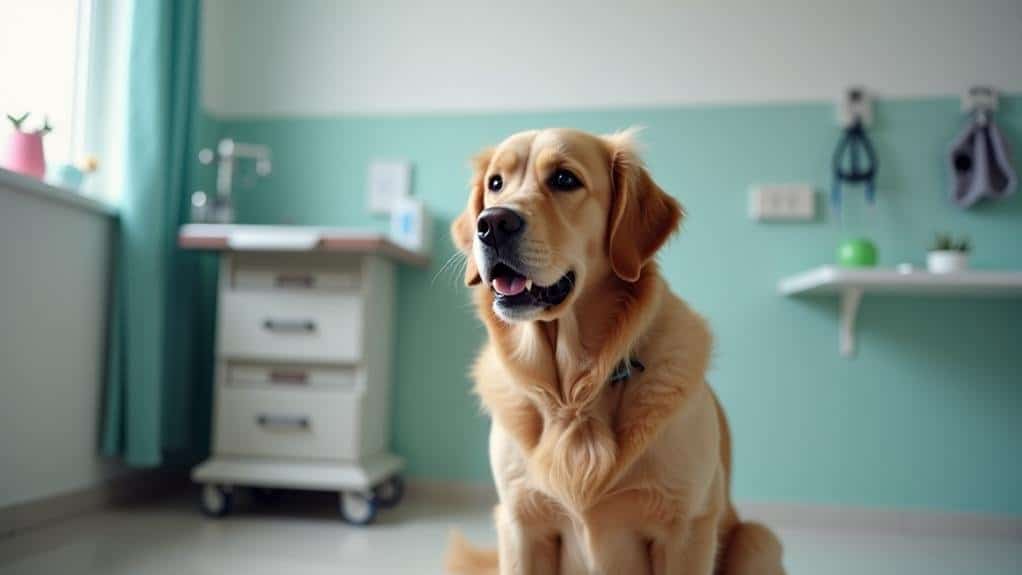
Anal glands play an essential role in your dog's health, but they can often be the source of discomfort and excessive licking. Located at the 4 PM and 8 PM positions around your dog's rectum, these glands can become impacted, leading to a condition called anal sac impaction.
If you notice your dog scooting on the ground, frequently licking their anal area, or showing signs of pain during defecation, it's time to take action.
To address anal gland issues and prevent excessive licking, consider the following steps:
- Schedule regular veterinary check-ups to monitor your dog's anal gland health
- Learn to recognize the signs of anal gland problems early on
- Implement dietary changes, such as adding pumpkin, to improve natural gland expression
If your dog can't express their anal glands naturally, manual expression by a veterinarian may be necessary.
In cases of anal gland infection, antibiotics might be prescribed. Remember, early intervention is key to preventing complications like abscesses or chronic anal sac disease.
Intestinal Parasites and Worms
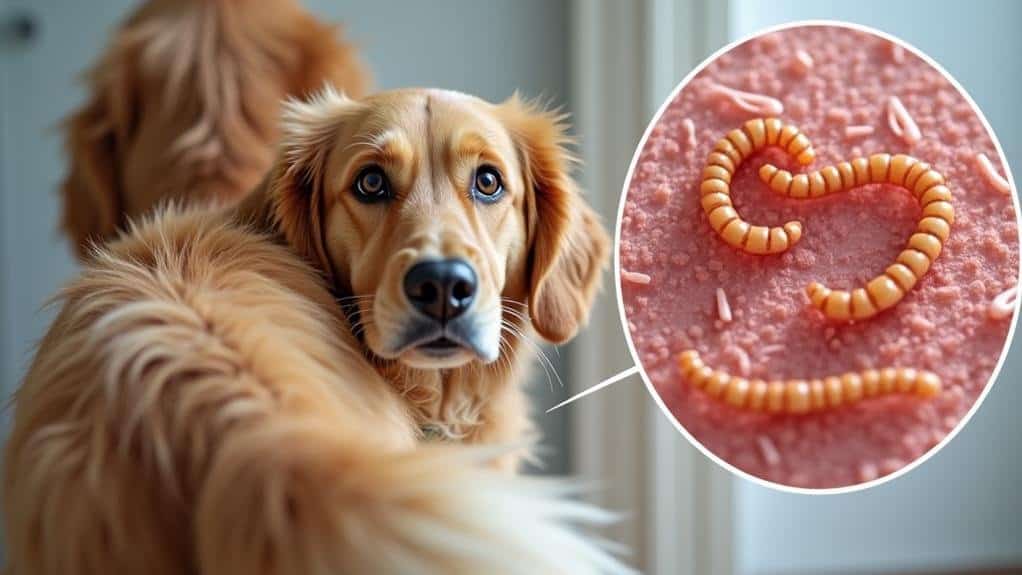
Beyond anal gland issues, intestinal parasites and worms can be another major cause of excessive licking in dogs. These pesky invaders, including tapeworms, hookworms, and roundworms, can wreak havoc on your dog's digestive system and cause significant discomfort.
You might notice your furry friend paying extra attention to their anal area, licking excessively due to the irritation caused by these parasites.
Tapeworms are particularly troublesome, as they can leave visible segments in your dog's feces, prompting even more licking. The intestinal irritation from parasites can also lead to loose stools, further exacerbating rectal irritation and the urge to lick.
It's vital to recognize that many dogs can be asymptomatic carriers, so regular fecal testing is essential for early detection.
If you suspect your dog has intestinal parasites, don't wait to take action. Deworming treatments are necessary for eliminating these unwanted guests and providing relief to your pet.
Additionally, implementing proper flea control measures can help prevent future infestations. By addressing intestinal parasites promptly, you can help your dog find relief from excessive licking and maintain better overall health.
Allergies and Skin Irritations
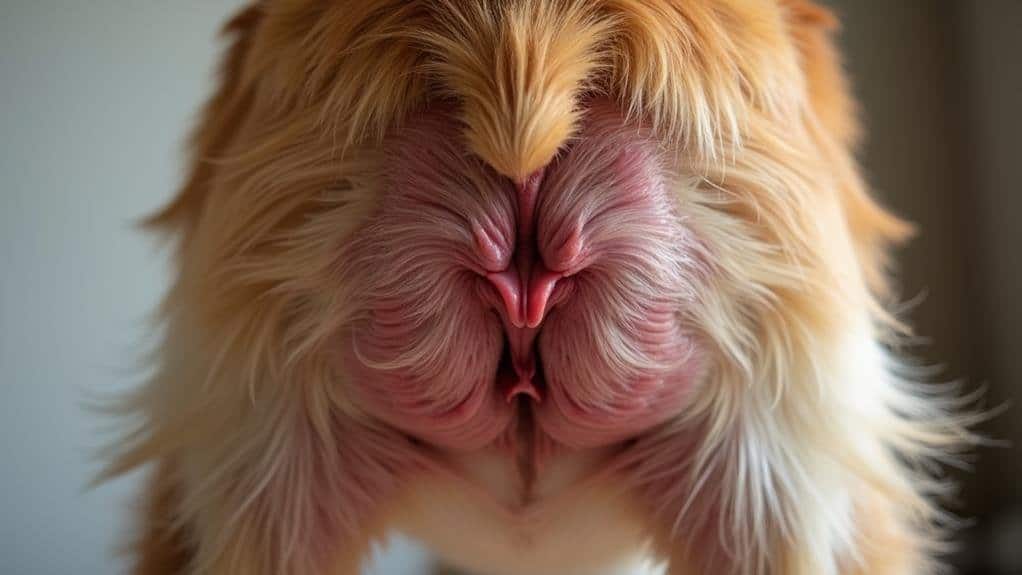
For many dogs, allergies and skin irritations can be a significant source of discomfort, often leading to excessive licking.
These allergies can be environmental or food-related, causing inflammation and itching around the anal area. Your dog's licking behavior may be an attempt to soothe the discomfort caused by symptoms like redness, dryness, and inflammation.
Common allergens that trigger these reactions include pollen, grass, molds, and specific food ingredients. To identify the root cause of your dog's allergies, consider veterinary allergy testing.
Once you've pinpointed the allergen, you can take steps to manage your dog's symptoms and reduce excessive licking.
Here are three effective ways to address allergies and skin irritations:
- Use probiotic shampoos to restore skin health and reduce inflammation
- Implement regular grooming and cleaning of the anal area to remove allergens and debris
- Work with your vet to develop a tailored treatment plan, which may include dietary changes or medication
Urinary Tract Infections
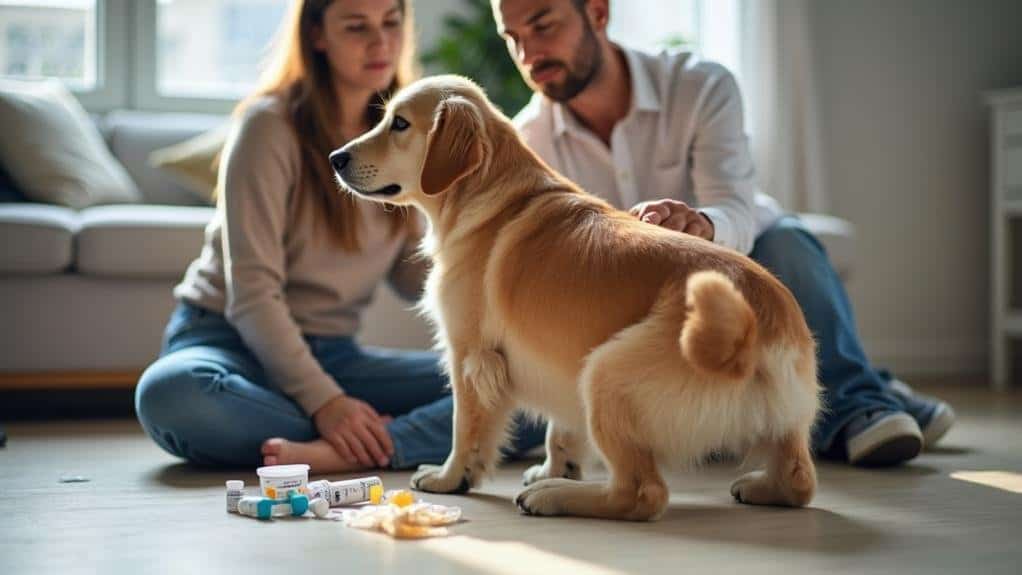
Urinary tract infections can be another culprit behind your dog's excessive butt licking. If you notice your furry friend frequently licking their anal area, it might be a sign of discomfort caused by a UTI. These infections often lead to inflammation, prompting your dog to seek relief through excessive licking.
Keep an eye out for other symptoms of urinary tract infections, such as frequent urination, straining while peeing, or blood in the urine.
Female dogs are more susceptible to UTIs due to their shorter urethras, which allow bacteria to enter more easily.
If you suspect your dog has a UTI, it's essential to consult a veterinarian promptly. They can perform a urinalysis to confirm the diagnosis and recommend appropriate treatment.
Typically, antibiotics are prescribed to eliminate the infection, and your vet may suggest dietary adjustments to prevent future occurrences.
Dietary Concerns and Solutions
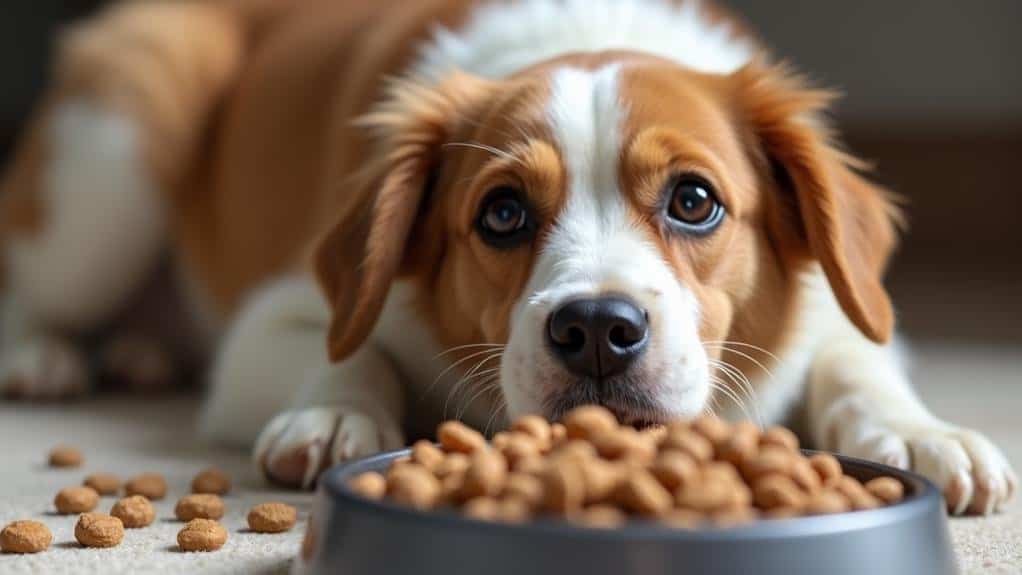
While addressing urinary tract infections is important, your dog's diet plays a key role in preventing excessive licking behaviors.
Dietary concerns can greatly impact your dog's anal glands and overall digestive health. A high-fiber diet promotes regular bowel movements, which can help prevent anal gland impaction and reduce licking. Consider adding canned pumpkin to your dog's meals for an extra boost of soluble fiber.
The quality of dog food you choose matters. Low-quality commercial foods may lead to soft stools, increasing the likelihood of anal gland issues. Opt for high-quality, well-balanced diets to mitigate this problem.
Additionally, maintain regular feeding schedules and practice portion control to help your dog maintain a healthy weight, reducing obesity-related anal gland problems.
To address potential dietary concerns and improve your dog's digestive health:
- Consult with your veterinarian to identify possible food allergies or sensitivities
- Gradually shift to a high-fiber, high-quality dog food
- Incorporate fiber-rich supplements like pumpkin into your dog's diet
Behavioral Factors
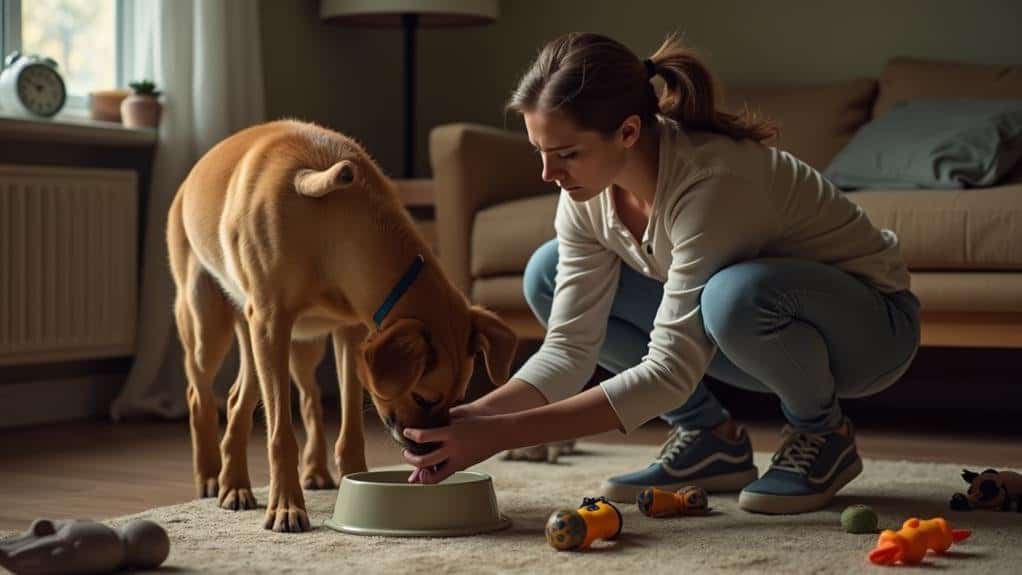
Beyond physical health issues, behavioral factors often contribute greatly to a dog's excessive licking habits. Stress and anxiety can lead to compulsive grooming as a coping mechanism, causing your dog to fixate on licking their butt.
Boredom is another common culprit; without adequate physical and mental stimulation, dogs may resort to excessive licking to relieve restlessness.
In multi-pet households, dogs can learn this behavior through observation, mimicking other dogs' licking habits. Additionally, your furry friend might engage in attention-seeking behavior, licking their butt if they notice it garners a reaction from you, even if it's negative.
To address these behavioral factors, consider implementing a thorough approach. Increase your dog's exercise routine and provide mental challenges through interactive toys or training sessions. This can help alleviate boredom and reduce anxiety.
Behavioral training techniques can also be effective in redirecting your dog's focus away from excessive licking. If you suspect anxiety is the root cause, consult with a veterinarian or animal behaviorist for tailored solutions.
Home Care and Prevention
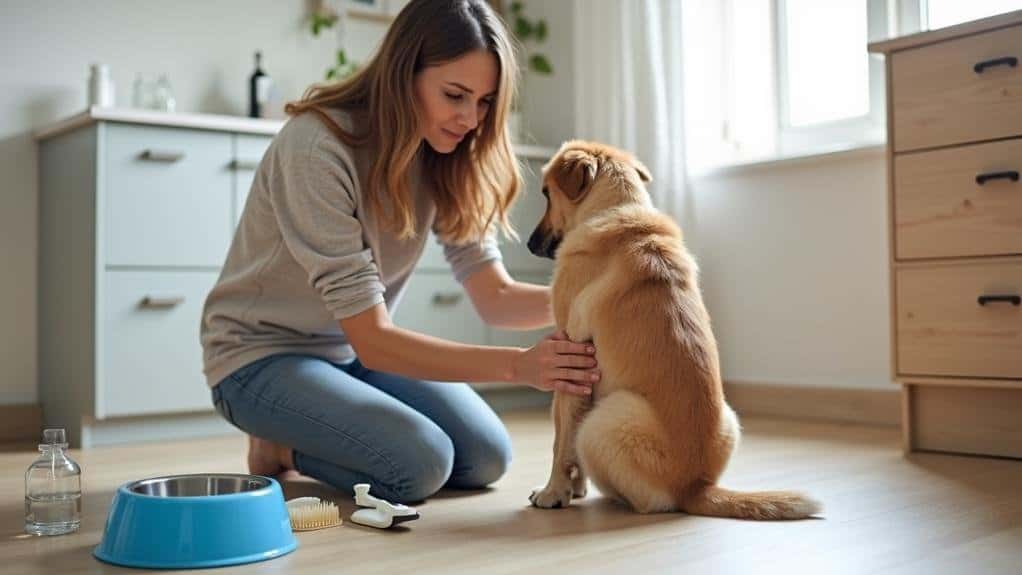
With behavioral factors addressed, let's turn our attention to home care and prevention strategies.
Regular grooming plays an essential role in reducing your dog's excessive licking. By bathing and brushing your pet frequently, you'll minimize debris accumulation around the anal area, which can cause irritation.
A healthy diet is equally important for prevention. Consider incorporating fiber-rich foods like canned pumpkin to promote regular bowel movements and assist in the natural expression of anal glands.
To effectively manage your dog's anal gland health and prevent excessive licking, follow these key steps:
- Schedule regular veterinary check-ups to detect and address potential issues early.
- Maintain a proper flea and parasite prevention regimen to reduce irritation.
- Provide mental and physical stimulation through exercise and interactive play to reduce boredom-related licking.
When to Consult a Veterinarian
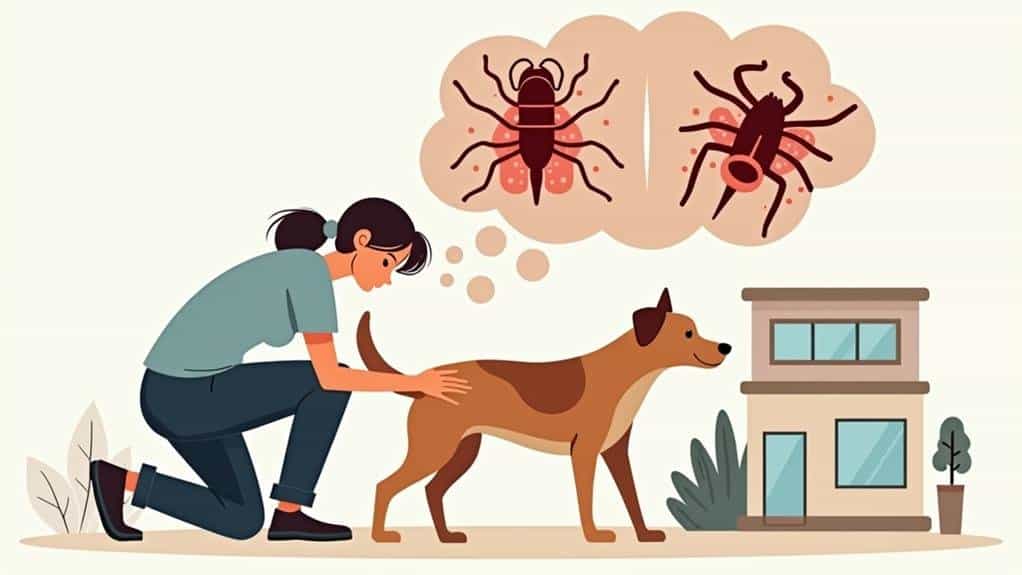
Despite your best efforts at home care and prevention, there may come a time when you need to consult a veterinarian about your dog's excessive licking behavior. If you notice your dog frequently licking its butt, it's vital to seek professional advice. Persistent licking can indicate underlying issues such as anal gland problems, infections, or allergies that require medical attention.
Don't hesitate to schedule a vet appointment if you observe red, inflamed skin around your dog's rear end or signs of discomfort. These symptoms could lead to further complications if left untreated.
Additionally, if your dog exhibits other concerning symptoms like vomiting, diarrhea, or unusual stool appearance alongside the excessive licking, it's time to consult a veterinarian immediately.
Regular check-ups are important for early detection and management of potential health problems related to this behavior. During these visits, discuss any changes in your dog's behavior, such as increased anxiety or compulsive licking.
Your vet can help identify underlying causes and recommend appropriate treatments. Remember, addressing excessive licking promptly can prevent more serious issues and guarantee your dog's overall well-being.
Frequently Asked Questions
Why Is My Dog Excessively Licking Privates?
Your dog's excessive licking of privates could be due to irritation, infection, or parasites. It might be caused by allergies, urinary tract issues, or skin conditions. Don't ignore it; consult your vet for a proper diagnosis and treatment.
Why Is My Dog Licking His Tail Near His Bum?
Your dog's tail-licking near the bum could be simple grooming, but it might signal anal gland issues, allergies, or parasites. If it's excessive or persistent, you'll want to monitor it closely and consider consulting your vet for a checkup.
Why Is My Dog Licking His Bum Excessively and Diarrhea?
Your dog's excessive bum licking and diarrhea could be due to anal gland issues, intestinal parasites, or allergies. These problems can cause discomfort and irritation. It's best to consult a vet for proper diagnosis and treatment.
What Does Constant Licking in a Dog Mean?
Constant licking in your dog can mean various things. It's often normal grooming, but it may signal health issues like allergies, infections, or anal gland problems. If it's excessive, you'll want to consult your vet for proper diagnosis.
Conclusion
You've learned that your dog's butt-licking can stem from various causes, from normal grooming to health issues. Remember, occasional licking is normal, but excessive behavior warrants attention. Monitor your pup's habits, maintain proper hygiene, and address potential underlying problems. If you're concerned, don't hesitate to consult your vet. With the right care and attention, you'll help guarantee your furry friend stays comfortable and healthy, free from excessive butt-licking woes.

